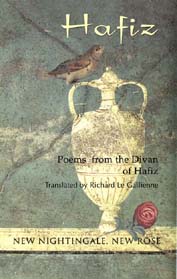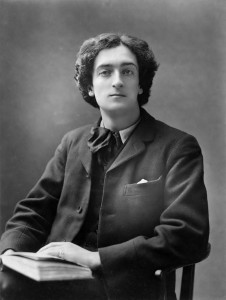Poems from the Divan of Hafiz
Translated by Richard Le Gallienne
 Hafiz of Shiraz was one of the very greatest Persian poets. Writing in the fourteenth century, his poems were collected as the Divan of Hafiz. The ghazals of Hafiz are erotic yet spiritual, both sensual and symbolic. Full of images of wine and the tavern, of the Beloved, of nightingales and roses, the poems of Hafiz have been regularly translated into English since the end of the eighteenth century. This new edition of Richard Le Gallienne’s moving and poetic translation finally brings one of the most popular versions of Hafiz back into print.
Hafiz of Shiraz was one of the very greatest Persian poets. Writing in the fourteenth century, his poems were collected as the Divan of Hafiz. The ghazals of Hafiz are erotic yet spiritual, both sensual and symbolic. Full of images of wine and the tavern, of the Beloved, of nightingales and roses, the poems of Hafiz have been regularly translated into English since the end of the eighteenth century. This new edition of Richard Le Gallienne’s moving and poetic translation finally brings one of the most popular versions of Hafiz back into print.
Hafiz was born around 1320 in Shiraz, Persia. His Divan is a classic of world literature and has been translated many times into English.Richard Le Gallienne was a contemporary of Oscar Wilde and W.B.Yeats, a member of the famous Rhymer’s Club, who used to meet in the Olde Cheshire Cheese pub in Fleet Street. Born in Liverpool England, he was a well-known and prolific literary figure from the 1890s until the end of his life. He moved to the United States at the beginning of the twentieth century, where his daughter, Eva Le Gallienne, became a famous actress.
For well over two hundred years the poetry of Hafiz has been appearing in English translation. The very first of these was the Persian Song in 1771, a baroque translation of the eighth poem in the Divan, by William Jones. Others followed and by now over a hundred different translators have tried their hands at Hafiz. The most notable recent translations are the very popular, very modern and exceedingly free versions of Daniel Ladinsky. Halfway between these two, published a century before the writing of this preface, Richard Le Gallienne produced a translation of one hundred of Hafiz’s poems. First published in New York in 1903, the poems went into several reprintings over the next twenty years, and must be counted among the most popular translations of Hafiz.Richard Le Gallienne was one of the decadent poets, a member of the Rhymers Club that met in the Cheshire Cheese pub off Fleet Street in the 1890s. He was thus a contemporary and associate of such characters as W. B. Yeats, OscarWilde, Ernest Dowson, and Aubrey Beardsley, to name only a few. This was an age of exquisite lyrics and most of the poets of this time had a fine control over the musicality of English verse. Yeats dubbed the poets of the 1890s ‘the tragic generation’, since so many of them had died early deaths and lived life with a hopeless recklessness. This poignancy comes through in these translations of Hafiz, but Le Gallienne must have been a little healthier and more stable, or just luckier, than the others, since he outlived them all. His only daughter, Eva Le Gallienne, became a well-known actress.
Hafiz was born around 1320AD in Shiraz, Persia. He was a contemporary of other fourteenth century notables such as Chaucer and Petrarch and, in the Islamic world, of the infamous conqueror Tamerlane, and of the poets Ibn-I-Yamin and Salman-I-Sawaji. Hafiz is a title for someone who has memorised the entire Koran: the poet’s given name was Shams-ud-din Mohammed. Hafiz lived in a time of political commotion, of coups and upheavals, though Shiraz escaped the worst results of the invasions of the Mongols and the Tartars.
His father died when he was relatively young and he had two older brothers; between the three of them they supported the family. Hafiz was bright, yet he had to work first for a draper and then at a bakery. He is said to have written his first poem by completing a poem begun by his untalented uncle.
While there is little in the way of hard historical fact, a number of anecdotes are told of Hafiz, many of them with a legendary or symbolic quality. The most famous of them is as follows. When he was twenty-one, and working as a baker, Hafiz was delivering bread in a prosperous district of Shiraz.
While doing his deliveries, he saw a beautiful woman and, of course, fell hopelessly in love with her. He was not a physically attractive man, nor, as a baker’s boy, wealthy, and had little chance of successfully wooing her. Hafiz began to write poems about her, and the poems circulated and became popular in Shiraz. He was still as hopelessly in love with her as before but, even though she knew of his poetry, the love was unrequited.
Published January 2004 by Bardic Press. Softcover, 180 pages, ISBN 0-9745667-0-5
- Buy it on Amazon.com
- Buy it on Amazon.co.uk
- Buy it on Book Depository
- Buy it on Barnes & Noble
Bardic Press books can be ordered by bookstores through Ingram and Baker & Taylor in the US, and through Bertrams and Gardners in the UK.

*woodburytype
*31 x 22 cm